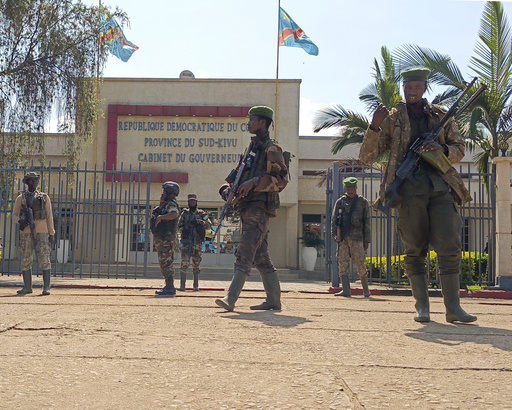
BUKAVU, Congo — On Sunday, the Congolese government announced that a second significant city in eastern Congo, known for its mineral wealth, has fallen under the control of Rwandan-backed rebels. The M23 rebel group confirmed their presence in Bukavu, stating their intention to restore order in the city after Congolese forces had vacated the area.
The Congo River Alliance, which comprises several rebel factions including M23, released a statement indicating that their fighters had chosen to aid the residents of Bukavu in confronting security issues under what was characterized as the “old regime.” The spokesperson for the alliance, Lawrence Kanyuka, asserted that their operations aim to enhance safety for the populace and protect their property, earning widespread approval from the local community which numbers around 1.3 million.
The rebels faced minimal opposition from government troops during their acclaimed expansion, accomplishing significant advances after lengthy bouts of conflict. While Congo’s government pledged to restore stability in Bukavu, no military presence was observed, as many soldiers were reportedly seen fleeing the city alongside numerous civilians on Saturday.
The M23 is among over 100 armed groups contesting control over eastern Congo, an area rich in minerals essential for global technology. United Nations experts estimate that the rebels receive assistance from approximately 4,000 troops from Rwanda.
The ongoing hostilities have displaced more than six million individuals, resulting in what is termed the largest humanitarian crisis worldwide.
In a stark message, M23 leader Bernard Maheshe Byamungu, who has faced sanctions from the U.N. Security Council due to human rights violations, addressed local residents outside the South Kivu governor’s office in Bukavu. He criticized the current state of affairs, referring to it as a “jungle,” and vowed, “We are going to clean up the disorder left over from the old regime.” Some supporters in the crowd encouraged the rebels to continue their advance toward Kinshasa, Congo’s capital, located nearly 1,000 miles away.
In response to the unfolding situation, Congo’s communications ministry acknowledged for the first time that Bukavu was indeed “occupied,” asserting that the national government was making every effort to regain control and restore order in the region.
A local inhabitant named Blaise Byamungu described how the rebels entered a city that had been “abandoned by all the authorities and without any loyalist force.” He questioned the government’s inaction, suggesting that it appeared cowardly to wait for further territorial losses before taking decisive measures.
Concerns regarding a broader regional conflict have emerged. Unlike in 2012 when M23 briefly captured Goma only to withdraw under international pressure, analysts believe the rebels now have intentions of seeking political power. The conflict in Congo is intertwined with a longstanding ethnic struggle, with the M23 asserting they are protecting ethnic Tutsis in the region. Rwanda claims that these Tutsis are facing persecution from Hutu factions and former militias linked to the 1994 genocide in Rwanda that resulted in the deaths of approximately 800,000 Tutsis and others. Following the genocide, many Hutus sought refuge in Congo, establishing the Democratic Forces for the Liberation of Rwanda militia.
While Rwanda claims that this militia is integrated into the Congolese military, the latter denies such assertions. Notably, the new leadership of M23, represented by Corneille Nangaa, is not of Tutsi ethnicity, which political scientists argue gives the group a diversified Congolese identity, challenging the narrative of being solely a Rwandan-supported entity.
President Felix Tshisekedi of Congo, whose government asserted control over Bukavu as recently as Saturday, has warned of the potential for the conflict to spread regionally. Congolese forces are being aided in Goma by South African troops and in Bukavu by Burundian forces. However, Burundi’s President Evariste Ndayishimiye hinted via social media that his nation would refrain from retaliatory actions amid the conflict.
At a recent African Union summit held in Ethiopia, the situation was a prominent topic, with U.N. Secretary-General António Guterres cautioning against the risk of escalating violence in the region. Despite the gravity of the situation, regional leaders and the international community have shown hesitance to take substantial action against M23 or Rwanda, one of Africa’s most formidable military powers, with most urging a ceasefire and dialogue between the conflicting parties.

